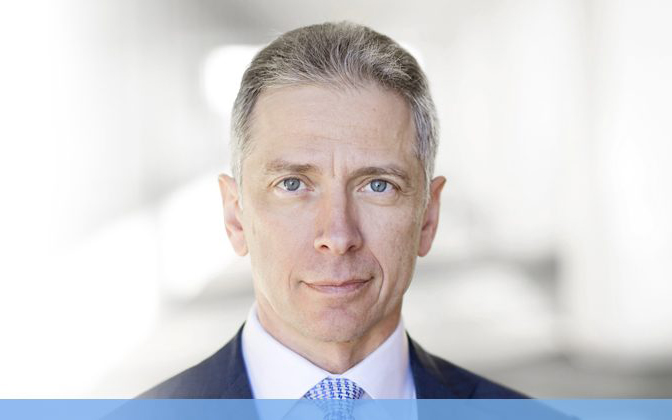By UCLA Samueli Newsroom
Andrei Iancu is the Under Secretary of Commerce for Intellectual Property and Director of the United States Patent and Trademark Office (USPTO), one of the largest intellectual property offices in the world.
Prior to receiving a Juris Doctor from the UCLA School of Law, where he also taught patent law, Iancu was first a Bruin Engineer. He holds a Master of Science in mechanical engineering and a Bachelor of Science in aerospace engineering from the UCLA Samueli School of Engineering, and started his career as an engineer at Hughes Aircraft Company.
He recently shared his thoughts on what led him to forge such a diverse and illustrious career.
Q: Why did you decide to study engineering at UCLA?
A: I was born in Romania and moved to the United States when I was 12. Since arriving inthe U.S., I spent virtually all my time in Los Angeles. Going to UCLA was always the dream, and I did not even apply to many other schools. Plus, UCLA Engineering was always a top school, so when I got in, going here was not a close call. I always knew I would be an engineer growing up. My dad was an engineer and so were all of his friends. Plus, I always loved science and technology, and especially the possibility of building new things that can change the human condition. I especially loved anything that flew. So aerospace engineering was exciting for me, opening up possibilities to take humans to places we have never been before.
Q: Upon graduation, you worked as an engineer at the Hughes Aircraft Company. How was that experience? What ultimately led you to pursue a law degree at UCLA?
A: Working at Hughes as a young engineer was an unparalleled experience. We were doing such amazingly exciting work, with brand new types of commercial satellites and surrounding technology. Plus, they gave me a significant level of responsibility for a young engineer. While there, I worked on antenna systems, and I had the privilege to help create a brand-new type of “shaped reflector” to enable direct broadcasting using a much lighter payload. This was an unbelievable experience for a young engineer. I felt extremely well prepared coming from UCLA Engineering, and I always said that I could not have done what I did at Hughes without my UCLA education. After a few years, I decided I wanted to get broader exposure to business and law, so I decided to go to law school. UCLA was again the obvious choice.
Q: Do you think there are similarities between studying engineering and law? Did your engineering education assist you in pursuing a law degree?
A: Yes, there are significant similarities between the study of law and engineering. Both require logical and critical thinking. Engineering students often do well in law school because of their training in problem solving.
Q: Can you share the path you followed to become the Under Secretary of Commerce for Intellectual Property and Director of the USPTO?
A: After law school, I worked as an intellectual property lawyer for more than 20 years [at Irell & Manella LLP]. I represented all types of clients — big and small companies, defendants and plaintiffs, biotech to high tech and everything in between. And for the last six years of my law firm practice, I was the firm’s managing partner. My technical experience as an engineer, intellectual property experience as a lawyer and management experience as leader of my law firm prepared me well to lead the USPTO. Plus, my broad-based experience representing all types of clients in many areas of technology is helping me understand the needs of the many different stakeholders who depend on the American intellectual property system.
Q: Have there been any situations where your engineering background may have assisted you in making decisions?
A: Well, the entire profession as a patent lawyer is helped by a science or engineering background. Technical issues come up all the time. A good patent lawyer needs to understand and then explain complex technical issues to others, such as judges and jurors, who may or may not have a technical background. You don’t need to have a science or engineering degree, and some of the country’s best intellectual property lawyers do not, but it certainly helps. For me, the engineering degrees I got from UCLA were critically important for my subsequent work as a patent lawyer. By the way, I did not have too many aerospace cases as a lawyer — until just a few years ago when I had a case dealing with airplane toilets! But having a technical degree in almost any field helps a patent lawyer understand technology and patents dealing with almost any other technical field. So, with my aerospace and mechanical engineering background, I was able to handle many cases dealing with all types of technologies, such as electronics, software, telecommunications, data processing and even biotechnology.
Q: Do you have any memorable experiences from your time at UCLA?
A: I spent a lot of time at UCLA, so I have many memorable experiences. The most fun was my time in a fraternity as an undergrad. In the school buildings themselves, I loved spending time at the wind tunnel. And I can’t forget the competition we had to design the lightest airplane possible, which my team won primarily by finding a very light engine that we mounted on a canard aircraft.
Q: Do you have any advice for Bruin engineers?
A: Stay flexible with your career choices, because your goals and opportunities may change over time. And at all times, whatever you do at any one given moment, be “all in” and give it everything you’ve got. Be invested and take ownership of your career and the work you do. You have a great education under your belt, and you can do anything you want — so go do it!

